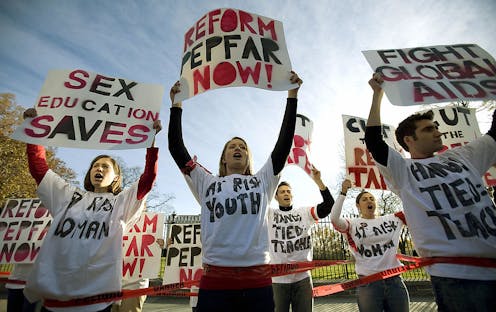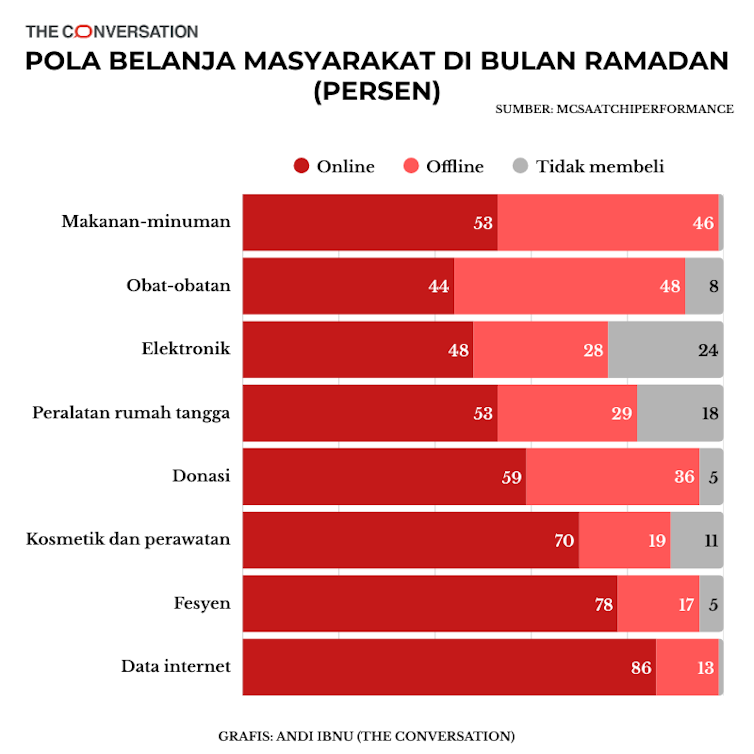Grassroots AIDS activists fought for and won affordable HIV treatments around the world – but PEPFAR didn't change governments and pharma
- Written by Dan Royles, Associate Professor of History, Florida International University

The President’s Emergency Program for AIDS Relief, or PEPFAR[1], has revolutionized the fight against global AIDS over the last 20 years. In that time[2], the U.S. program has brought antiretroviral treatment to nearly 19 million people living with HIV, the virus that causes AIDS; prevented mother-to-child transmission of HIV for 2.8 million babies; and brought HIV testing and prevention services to millions of others.
But this program would not be so successful – and might not even exist – without the work of grassroots AIDS activists around the world.
As a historian of social movements[3], I spent years interviewing AIDS activists, digging through their papers and scanning old websites, group email lists and message boards. These sources showed that, over the course of more than a decade, these activists challenged the status quo to demand – and deliver – HIV treatment to millions of poor people around the world.
Treatment Action Campaign activists in South Africa put pressure on drugmakers and governments for access to HIV medication.AIDS drugs for Africa
In his 2003 State of the Union address[4], then-U.S. President George W. Bush announced the creation of PEPFAR when he called for an astounding US$15 billion in funding over five years for the fight against AIDS in Africa and the Caribbean.
His announcement did not come out of nowhere. By that point, AIDS activists had spent years fighting to bring treatments for HIV to low- and middle-income countries hardest hit by the epidemic. My book, “To Make the Wounded Whole[5],” describes how members of the AIDS Coalition to Unleash Power (ACT UP) Philadelphia linked their own struggles for affordable, quality health care for poor people with AIDS in the U.S. to similar struggles around the world.
This fight began in earnest in the late 1990s when highly effective antiretrovirals to treat HIV became available, giving a new lease on life to those who could access them. But the new drugs were expensive, and activists saw that their high cost would put them out of reach for most who needed them[6].
Some low- and middle-income countries took their own steps to make life-saving antiretrovirals available. In 1997, South Africa, in the midst of a rapidly growing HIV epidemic, passed the Medicines and Related Substances Act[7], allowing the government to produce or acquire less-expensive generic versions of the drugs. Meanwhile, domestically produced generics[8] were a cornerstone of Brazil’s program to provide access to free antiretrovirals for people living with HIV/AIDS in the country.
Pharmaceutical companies opposed these efforts[9], with a representative of the Pharmaceutical Research and Manufacturers Association (PhRMA) claiming that countries that produced generics committed “a form of patent piracy.” So, too, did the Clinton administration, claiming that South Africa and Brazil violated intellectual property agreements under the World Trade Organization. In particular, former Vice President Al Gore, acting as chair of the U.S.-South Africa Binational Commission, and Charlene Barshefsky, the U.S. Trade Representative, pressured their South African counterparts[10] to change the law in 1999.
Activists fought back against both the pharmaceutical industry and the policymakers who put intellectual property rules, and the corporate profits they protected, ahead of saving people’s lives. Members of ACT UP Philadelphia, along with others, hounded Gore on the presidential campaign trail[12], chanting, “Gore is killing Africans – AIDS drugs now,” and occupied Barshefsky’s office in Washington[13]. They also participated in a massive demonstration at the 2000 International AIDS Conference in Durban, South Africa, with thousands of marchers from around the world crying “Phansi, Pfizer, phansi![14]” (“phansi” is Zulu for “down”) to demand a reduction in the drug company’s AIDS treatment prices.
All of this agitation worked. Clinton curbed his administration’s pressure campaign[15] against South Africa. Thanks in part to the wider availability of generics, the average cost of antiretrovirals fell dramatically[16]. And the 2001 World Trade Organization Ministerial Conference in Doha, Qatar[17], affirmed that public health and “access to medicines for all” would be paramount in the fight against HIV/AIDS and other epidemics.
Having succeeded in making antiretrovirals more affordable, activists pressed for an international program to purchase and distribute them. According to journalist Emily Bass, external pressure from grassroots activists[18] gave global health advocates within the Bush administration, including National Institute of Allergy and Infectious Diseases Director and chief medical advisor Anthony Fauci, the opportunity to push forward their proposal for a massive effort by the U.S. to treat AIDS in Africa. That proposal quickly evolved into PEPFAR.
John Robert Engole was the first patient to receive HIV treatment under PEPFAR.Activists continued to shape PEPFAR as the program came together. They advocated for people with AIDS to be treated with generic antiretrovirals, which allowed more people to be treated than would otherwise be possible with patented drugs. And when it came time to renew PEPFAR in 2008, they extracted promises from presidential candidates[19] to reauthorize the program at $50 billion[20], over three times Bush’s initial pledge.
Today, PEPFAR works in over 50 countries[21], including in Central and South America, Southeast Asia and the former Soviet Union. Since 2003, the program has injected over $100 billion[22] into the fight against global AIDS, although annual funding levels have been flat for most of that time[23]. Yet despite stagnant funds, PEPFAR has brought treatment to an increasing number of people in need. That it has done so is in no small part thanks to the AIDS activists who fought to make generic antiretrovirals available, allowing the program to treat many more people than would otherwise be possible.
Lessons unlearned
To be sure, the Bush administration had its own reasons to address AIDS in Africa. National security experts at the U.S. State Department had long worried that AIDS would destabilize the continent[24], as historian Jennifer Brier has shown, and PEPFAR burnished the president’s commitment to “compassionate conservatism” and faith-based social programs[25].
But by the time of Bush’s announcement, grassroots activists had already spent years arguing in public that treating AIDS in Africa was not only possible but imperative. And their advocacy for low-cost generic antiretrovirals paved the way for global AIDS treatment on a scale that had once been thought impossible.
Unfortunately, U.S. responses to recent viral epidemics have not shown evidence that the nation has learned from the PEPFAR example. The hoarding of COVID-19 vaccines[27] by the U.S. and other wealthy nations shows the same persistent disregard for human life that was evident in attempts to block generic medicines from reaching people who needed them. At the same time, millions of doses of a highly effective vaccine against mpox in the U.S. national vaccine stockpile were allowed to expire[28] while outbreaks of the virus raged in West and Central Africa[29] in 2022. And early 2023 announcements that Pfizer and Moderna may both price their COVID-19 vaccines at well over $100 per dose[30] in the U.S. recalls the exorbitant drug prices that aroused activist fury in the fight against AIDS.
PEPFAR has saved millions of lives, in no small part because activists thought big and fought hard for justice in the U.S. response to global AIDS. Although the program is far from perfect, it serves as a reminder of what is possible when solidarity guides responses to humanity’s biggest challenges, and the power of grassroots organizing in turning principles into policy.
References
- ^ President’s Emergency Program for AIDS Relief, or PEPFAR (www.kff.org)
- ^ In that time (www.state.gov)
- ^ historian of social movements (scholar.google.com)
- ^ 2003 State of the Union address (www.washingtonpost.com)
- ^ To Make the Wounded Whole (uncpress.org)
- ^ put them out of reach for most who needed them (actupny.org)
- ^ Medicines and Related Substances Act (www.jstor.org)
- ^ domestically produced generics (doi.org)
- ^ Pharmaceutical companies opposed these efforts (web.archive.org)
- ^ pressured their South African counterparts (www.cptech.org)
- ^ Khalil Senosi/AP Photo (newsroom.ap.org)
- ^ hounded Gore on the presidential campaign trail (actupny.org)
- ^ occupied Barshefsky’s office in Washington (www.democracynow.org)
- ^ Phansi, Pfizer, phansi! (actupny.org)
- ^ curbed his administration’s pressure campaign (www.sfgate.com)
- ^ fell dramatically (www.msf.org)
- ^ 2001 World Trade Organization Ministerial Conference in Doha, Qatar (www.wto.org)
- ^ external pressure from grassroots activists (www.publicaffairsbooks.com)
- ^ extracted promises from presidential candidates (healthgap.org)
- ^ reauthorize the program at $50 billion (fpif.org)
- ^ works in over 50 countries (www.state.gov)
- ^ over $100 billion (www.kff.org)
- ^ annual funding levels have been flat for most of that time (www.kff.org)
- ^ long worried that AIDS would destabilize the continent (uncpress.org)
- ^ compassionate conservatism” and faith-based social programs (newrepublic.com)
- ^ Alison Yin/AP Images for AIDS Healthcare Foundation (newsroom.ap.org)
- ^ hoarding of COVID-19 vaccines (doi.org)
- ^ allowed to expire (www.nytimes.com)
- ^ raged in West and Central Africa (doi.org)
- ^ well over $100 per dose (arstechnica.com)
Authors: Dan Royles, Associate Professor of History, Florida International University





